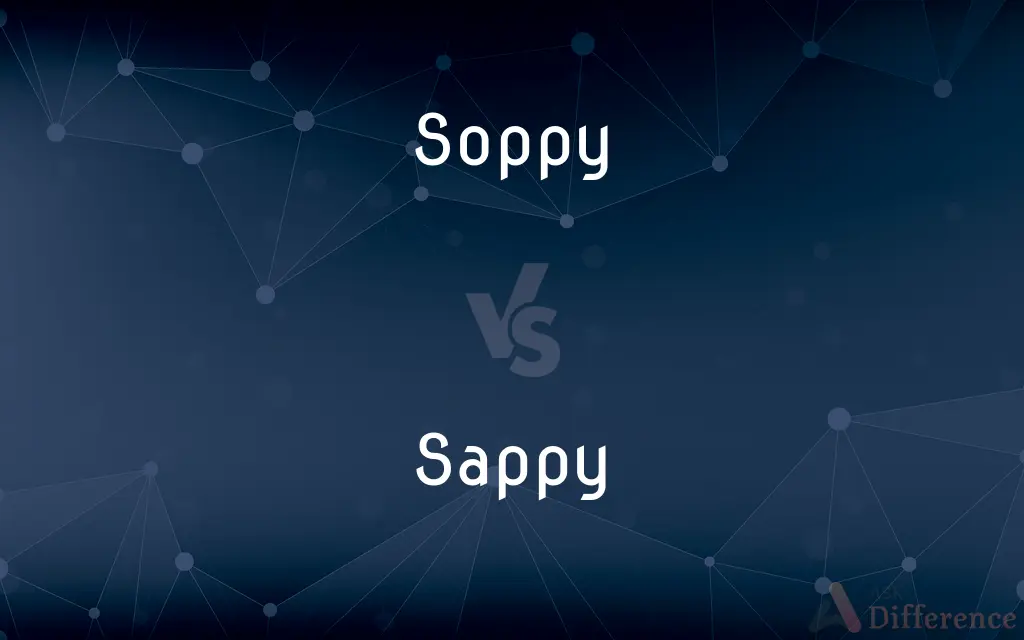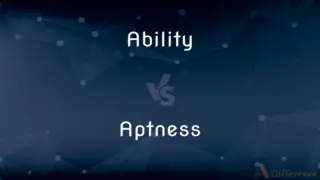Soppy vs. Sappy — What's the Difference?
By Maham Liaqat & Urooj Arif — Updated on April 5, 2024
Soppy denotes excessive sentimentality, while sappy refers to being overly sentimental or foolishly romantic.

Difference Between Soppy and Sappy
Table of Contents
ADVERTISEMENT
Key Differences
Soppy is often used to describe situations, expressions, or individuals showing excessive emotional sentimentality, sometimes to the point of being maudlin or overly sentimental. This can include tear-jerking movie scenes or overly affectionate behavior. On the other hand, sappy, while also denoting sentimentality, carries a connotation of being foolishly romantic or naively sentimental, often in a manner that seems insincere or exaggerated to the point of ridiculousness.
In literature and media, a soppy story might try to evoke emotions by focusing on sad or touching moments, sometimes relying on clichés. Sappy content, while similar, might include elements that are not only overly sentimental but also lack depth or sophistication, appealing to a simplistic notion of love or emotion.
The perception of what is considered soppy or sappy can vary greatly among individuals, influenced by cultural norms and personal tolerance for sentimentality. While some may find certain gestures or narratives endearing, others might label the same actions as soppy or sappy, viewing them as excessively sentimental.
The use of soppy tends to be more common in British English, where it is often used to describe something overly sentimental in a somewhat negative light. Sappy, more frequently used in American English, similarly critiques an excess of sentiment but can also suggest a kind of naive or unrefined emotional expression.
Despite their nuances, both terms suggest an excess in sentimentality that may not resonate with everyone. Whether something is considered soppy or sappy often depends on the context and the audience's emotional engagement with the content.
ADVERTISEMENT
Comparison Chart
Definition
Excessively sentimental
Overly sentimental or foolishly romantic
Connotation
Often negative, implying too much emotion
Implies naivety or lack of sophistication
Usage
More common in British English
More common in American English
Context
Can be used for actions, narratives, expressions
Often associated with narratives, behavior
Perception
Varies by individual and culture
Subject to personal and cultural views
Compare with Definitions
Soppy
Excessively sentimental.
The movie's soppy ending left half the audience in tears.
Sappy
Naive in emotion.
His sappy understanding of relationships is due to his lack of experience.
Soppy
Overly emotional.
His soppy love letters were filled with clichés.
Sappy
Overly sentimental.
Her sappy love songs are popular despite the predictable lyrics.
Soppy
Affectionate to a fault.
Their soppy displays of affection made their friends uncomfortable.
Sappy
Sickeningly sweet.
The couple's sappy nicknames for each other were hard to listen to.
Soppy
Drenched or soaked.
Walking home in the rain left me feeling soppy and miserable.
Sappy
Foolishly romantic.
The sappy dialogue in the play seemed unrealistic.
Soppy
Maudein or tear-jerking.
The novel's soppy narrative failed to impress critics.
Sappy
Full of sap (literal).
The sappy tree left a sticky residue on my hands.
Soppy
Soaked; sopping.
Sappy
"Sappy" is a song by the American rock band, Nirvana, written by vocalist and guitarist, Kurt Cobain. It was first released as a hidden track on the AIDS-benefit compilation album, No Alternative, in October 1993.
Soppy
Rainy.
Sappy
(Slang) Excessively sentimental; mawkish.
Soppy
Sentimental; maudlin.
Sappy
(Slang) Silly or foolish.
Soppy
Very wet; sodden, soaked.
Sappy
Full of sap.
Soppy
(figurative) Overly sentimental, maudlin, schmaltzy.
Sappy
(US) Excessively sweet, emotional, nostalgic; cheesy; mushy. (British equivalent: soppy)
It was a sappy love song, but it reminded them of their first dance.
Soppy
Soaked or saturated with liquid or moisture; very wet or sloppy.
It [Yarmouth] looked rather spongy and soppy.
Sappy
Having (a particularly large amount of) sap.
Soppy
Wet through and through; thoroughly wet;
Stood at the door drenched (or soaked) by the rain
A shirt saturated with perspiration
His shoes were sopping (or soaking)
The speaker's sodden collar
Soppy clothes
Sappy
(obsolete) Juicy.
Sappy
Spongy; Having spaces in which large quantities of sap can flow.
Sappy
(obsolete) Musty; tainted; rancid.
Sappy
Abounding with sap; full of sap; juicy; succulent.
Sappy
Hence, young, not firm; weak, feeble.
When he had passed this weak and sappy age.
Sappy
Weak in intellect.
Sappy
Abounding in sap; resembling, or consisting largely of, sapwood.
Sappy
Musty; tainted.
Sappy
Pungent adjectives of disesteem;
Gave me a cockamamie reason for not going
Wore a goofy hat
A silly idea
Some wacky plan for selling more books
Sappy
Abounding in sap;
Sappy maple trees
Sappy kindling wood
Common Curiosities
What is the main difference between soppy and sappy?
Soppy denotes excessive sentimentality, often with a negative connotation, while sappy implies foolish sentimentality or naive romanticism.
Is one term more negative than the other?
Both terms can carry negative connotations, but the perception of negativity often depends on the context and personal views.
Are these terms only used in negative contexts?
Primarily, yes, but they can also be used affectionately or humorously in certain contexts.
Is it possible for a movie or book to be both soppy and sappy?
Yes, a work can be both if it is excessively sentimental in a way that seems both overly emotional and naively romantic.
How do personal preferences affect perceptions of something being soppy or sappy?
Individual tolerance for sentimentality greatly influences whether one perceives something as soppy or sappy.
Can the terms be used interchangeably?
While similar, they are not always interchangeable due to subtle differences in connotation and usage.
How can one avoid creating soppy or sappy content?
By aiming for emotional depth and authenticity, avoiding clichés, and maintaining a balance between sentimentality and realism.
Can a person be described as soppy or sappy?
Yes, a person can be described as either, based on their tendency towards excessive sentimentality or foolish romanticism.
How does cultural context affect the use of these terms?
Soppy is more common in British English and sappy in American English, with each culture having different thresholds for sentimentality.
Can the context change the meaning of these terms?
Yes, the context in which they are used can influence their perceived level of negativity or affection.
Can something be positively described as soppy or sappy?
Rarely, but in some contexts, these terms might be used affectionately to describe genuine sentimentality.
Do these terms have literal meanings?
Soppy can mean soaked or drenched, and sappy can refer to something full of sap, but these are less common uses.
Can soppy or sappy elements appeal to audiences?
Yes, there is an audience for every type of content, and some people enjoy sentimental narratives.
How do these terms relate to cultural products like movies and books?
They are often used to critique content deemed overly sentimental or lacking in emotional depth.
Is the perception of what is soppy or sappy subjective?
Yes, it is highly subjective and varies greatly among individuals and cultures.
Share Your Discovery

Previous Comparison
Ability vs. Aptness
Next Comparison
Accident vs. MishapAuthor Spotlight
Written by
Maham LiaqatCo-written by
Urooj ArifUrooj is a skilled content writer at Ask Difference, known for her exceptional ability to simplify complex topics into engaging and informative content. With a passion for research and a flair for clear, concise writing, she consistently delivers articles that resonate with our diverse audience.















































